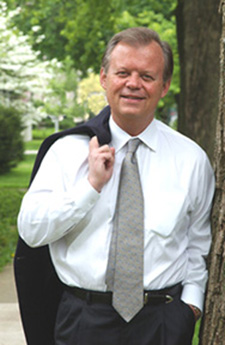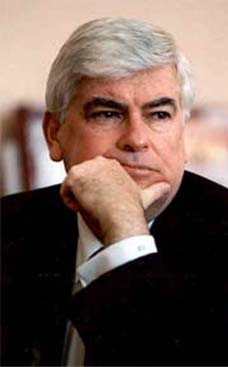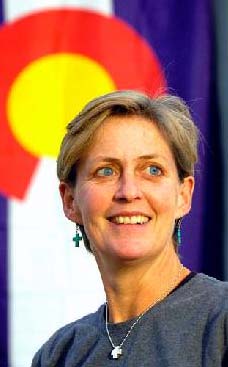
"Despite their bravado, North Korea's rulers understand their country's dire straits. They want more help from the West, particularly from the US. Above all, they want the respect and security that they believe would spring from a lasting bilateral relationship with the US, not from the current six-party talks. They're crying for attention, and the only way they know to command it is to fire their missiles and rattle their nuclear bombs. If the US granted that attention through direct, serious, comprehensive talks with Pyongyang without preconditions, it would have the potential of putting North Korea's nuclear-weapons program back in the freezer. And it might begin to pull the Hermit Kingdom into the community of civilized nations." Former Congressman Tony Hall of Ohio, was ambassador to the United Nations Agencies for Food and Agriculture and served as a Peace Corps Volunteer in Thailand in the 1960's.
Tony Hall writes: What North Korea really wants
What North Korea really wants
The 'Hermit Kingdom' desires a better relationship with the West – the US in particular.
By Tony Hall
WASHINGTON - In late 2004, I stood at the edge of the Sahara Desert and marveled at a scene that would have been impossible to imagine a short time before. Near the ancient trading post of Al Kufrah, where Libya's asphalt roads surrender to sand, a convoy of 350 trucks headed off into the desert on its way to refugee camps in Chad. These Libyan trucks were piled high with bags that carried the stamp "U.S.A." and contained two months of American-grown food for 200,000 refugees from Darfur.
In three decades as a US congressman, ambassador, and now as a humanitarian activist, I have traveled to more than 100 countries, many of them places of hunger, poverty, warfare, or oppression. I have met some of the world's worst despots and witnessed the horror they can create. I also have, as in Libya, witnessed good deeds done by those who are best known for wickedness. I have learned from these experiences that we should persist in our efforts to help the poor and liberate the oppressed. We also should be ready to engage our enemies, give them opportunities to do good – and maybe some day convert them into friends.
The pressure of UN sanctions finally helped lead Libyan dictator Muammar Qaddafi, an international pariah, to seek a new relationship with the civilized world. One fruit of subsequent engagement with him was obtaining a better route for shipping relief supplies to Darfur's starving refugees.
The United States is missing the opportunity to directly engage North Korea in a similar process. As a result, the world is less safe. The North's inflammatory rhetoric and nuclear weapons-rattling don't exactly promote engagement. But I am convinced that, beneath the hostile noise, its leaders want to develop a better relationship with the West, and especially with the US.
Seeing the 'Hermit Kingdom' firsthand
I've concluded this because I was able to make six visits to the "Hermit Kingdom" while I was a member of Congress, traveling throughout that troubled country with surprising freedom. Accompanied by my own interpreter (so I could have uncensored conversations with the North Koreans I met), I saw the horrors of a dysfunctional economy, an unproductive agriculture, and an oppressive totalitarian political system.
I saw people eating grass, doctors performing surgery without anesthetics, children so growth-stunted that 18-year-olds appeared to be 9. I saw people taught to fear an evil America by news media and schools devoted to propaganda. I also saw people carrying bags, emblazoned with the US flag, in which they had received food aid.
On my last visit, in late 2000, I met high-ranking North Korean officials – but not supreme "Dear Leader" Kim Jong Il – who begged me to help them come to terms with the US. Some progress had been made in a 1994 agreement that froze North Korea's nuclear-weapons program. In the waning days of the Clinton administration, the North Koreans wanted to build on that. Secretary of State Madeleine Albright had traveled to Pyongyang in October 2000, met with Mr. Kim, and told President Clinton he could get an agreement by going to North Korea himself.
An urgent appeal for a deal
Nothing came of that appeal, so the North Koreans turned to me. Please, they said, urge your president to come here. If he will talk with us directly, we can negotiate an agreement that would lead to dismantling our nuclear-weapons program.
On my way home, I stopped in South Korea where then-President Kim Dae-jung made the same plea. He wouldn't let me leave his office until he was convinced I would carry the message to Washington.
I did urge Mr. Clinton to go, but he was focused exclusively on a final, unsuccessful, attempt to broker a Middle East peace. The Bush administration adopted a harder line toward North Korea. But we now know that Kim Jong Il continued to seek the US president's attention, sending a written personal message to President Bush through two well-regarded US foreign-policy experts who visited Pyongyang in 2002. In it, Kim said engagement could lead to a resolution of the nuclear-weapons conflict.
Like Clinton, Mr. Bush did not take advantage of this opening. It was then that North Korea expelled UN weapons inspectors, withdrew from the Nuclear Non-proliferation Treaty, and reopened plutonium production facilities that had been closed as the result of the Clinton-era negotiations.
Despite their bravado, North Korea's rulers understand their country's dire straits. They want more help from the West, particularly from the US. Above all, they want the respect and security that they believe would spring from a lasting bilateral relationship with the US, not from the current six-party talks. They're crying for attention, and the only way they know to command it is to fire their missiles and rattle their nuclear bombs.
If the US granted that attention through direct, serious, comprehensive talks with Pyongyang without preconditions, it would have the potential of putting North Korea's nuclear-weapons program back in the freezer. And it might begin to pull the Hermit Kingdom into the community of civilized nations.
• Tony Hall is the author of "Changing the Face of Hunger."


















